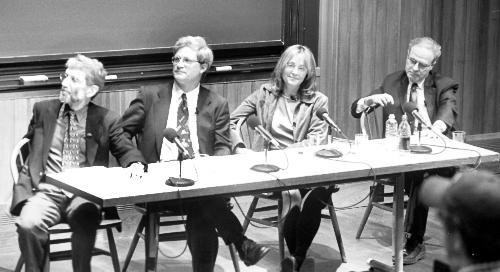
Professors DAVID PILBEAM, JAMES ENGELL, MARIA TATAR and JORGE DOMINGUEZ (left to right), wait to speak as part of a symposium on the Core Curriculum yesterday in Sever Hall.
Just over 50 faculty, administrators, and students attended last night’s symposium on the Core to hear four senior Harvard professors weigh in on its future. In the first public discussion about the recently begun curricular review, Harvard College Professor Jorge I. Dominguez, Gurney Professor of English Literature James Engell, Ford Professor of Social Sciences David Pilbeam and Harvard College Professor Maria M. Tatar were featured speakers.
The panel was presided over by Dean of Undergraduate Education Benedict H. Gross ’71 and was attended by Dean of Faculty William C. Kirby.
In their speeches, the featured professors repeatedly said they expected students to play a critical role in this curricular review.
Two professors independently praised a 1997 critique of the Core written by James T. L. Grimmelmann ’99, Sarah K. Hurwitz ’99 and Benjamin A. Rahn ’99—three students that served on the Student Affairs Committee of the Undergraduate Council. Engell said that he hopes students feel motivated to produce such a report again.
“It is one of the most astute and penetrating reports ever produced,” he said.
But students’ attendance was lower than expected last night.
Even though the Office of Undergraduate Education had predicted an attendance of over a hundred, Gross said he was happy with the turnout.
“I was pleased to see that there were a lot of informed and interested students here,” he said.
And students expressed an equal amount of respect for the opinions of the Faculty.
“I was very impressed with all the work that went into these talks tonight, and I am confident that students and faculty can come together for a thoughtful review,” said Alexander B. Patterson ’03, a student member of the Committee on Undergraduate Education .
Yet despite citing the important role students will play thought the review process the professors were also quick to point out differences between student and faculty prerogative—making it clear which would ultimately prevail.
In response to a question posed by David M. Darst ’05 on whether or not students might ultimately be able to vote on a general education program to replace the Core, faculty dismissed the idea.
“This is not a democracy. While it is important to have a good understanding of student opinion, the decision will ultimately be made by us,” Pilbeam said.
Pilbeam, who said that he recently met with a group of 12 first-years to discuss the Core, spoke about how decreased student attendance and interest in the Core has made his experience teaching in it much less enjoyable.
“I feel like I am part of an experiment in distance learning,” he said. “And it is frustrating when you put your soul out there every time.”
Read more in News
Students Serve Up Pizza, Advice












